Go to the source code of this file.
Data Structures | |
| struct | avl_node |
| struct | avl_tree |
Macros | |
| #define | EXPORT(sym) sym |
| #define | AVL_TREE_INIT(_name, _comp, _allow_dups, _cmp_ptr) |
| #define | AVL_TREE(_name, _comp, _allow_dups, _cmp_ptr) |
| #define | avl_find_element(tree, key, element, node_element) ((__typeof__(*(element)) *)__avl_find_element(tree, key, offsetof(typeof(*(element)), node_element), AVL_FIND_EQUAL)) |
| #define | avl_find_le_element(tree, key, element, node_element) ((__typeof__(*(element)) *)__avl_find_element(tree, key, offsetof(typeof(*(element)), node_element), AVL_FIND_LESSEQUAL)) |
| #define | avl_find_ge_element(tree, key, element, node_element) ((__typeof__(*(element)) *)__avl_find_element(tree, key, offsetof(typeof(*(element)), node_element), AVL_FIND_GREATEREQUAL)) |
| #define | avl_first_element(tree, element, node_member) container_of((tree)->list_head.next, __typeof__(*(element)), node_member.list) |
| #define | avl_last_element(tree, element, node_member) container_of((tree)->list_head.prev, __typeof__(*(element)), node_member.list) |
| #define | avl_next_element(element, node_member) container_of((&(element)->node_member.list)->next, __typeof__(*(element)), node_member.list) |
| #define | avl_prev_element(element, node_member) container_of((&(element)->node_member.list)->prev, __typeof__(*(element)), node_member.list) |
| #define | avl_for_element_range(first, last, element, node_member) |
| #define | avl_for_element_range_reverse(first, last, element, node_member) |
| #define | avl_for_each_element(tree, element, node_member) |
| #define | avl_for_each_element_reverse(tree, element, node_member) |
| #define | avl_for_element_to_last(tree, first, element, node_member) avl_for_element_range(first, avl_last_element(tree, element, node_member), element, node_member) |
| #define | avl_for_element_to_last_reverse(tree, first, element, node_member) avl_for_element_range_reverse(first, avl_last_element(tree, element, node_member), element, node_member) |
| #define | avl_for_first_to_element(tree, last, element, node_member) avl_for_element_range(avl_first_element(tree, element, node_member), last, element, node_member) |
| #define | avl_for_first_to_element_reverse(tree, last, element, node_member) avl_for_element_range_reverse(avl_first_element(tree, element, node_member), last, element, node_member) |
| #define | avl_for_element_range_safe(first_element, last_element, element, node_member, ptr) |
| #define | avl_for_element_range_reverse_safe(first_element, last_element, element, node_member, ptr) |
| #define | avl_for_each_element_safe(tree, element, node_member, ptr) |
| #define | avl_for_each_element_reverse_safe(tree, element, node_member, ptr) |
| #define | avl_remove_all_elements(tree, element, node_member, ptr) |
Typedefs | |
| typedef int(* | avl_tree_comp) (const void *k1, const void *k2, void *ptr) |
Enumerations | |
| enum | avl_find_mode { AVL_FIND_EQUAL , AVL_FIND_LESSEQUAL , AVL_FIND_GREATEREQUAL } |
Functions | |
| void | avl_init (struct avl_tree *, avl_tree_comp, bool, void *) |
| struct avl_node * | avl_find (const struct avl_tree *, const void *) |
| struct avl_node * | avl_find_greaterequal (const struct avl_tree *tree, const void *key) |
| struct avl_node * | avl_find_lessequal (const struct avl_tree *tree, const void *key) |
| int | avl_insert (struct avl_tree *, struct avl_node *) |
| void | avl_delete (struct avl_tree *, struct avl_node *) |
| static bool | avl_is_first (struct avl_tree *tree, struct avl_node *node) |
| static bool | avl_is_last (struct avl_tree *tree, struct avl_node *node) |
| static bool | avl_is_empty (struct avl_tree *tree) |
| static void * | __avl_find_element (const struct avl_tree *tree, const void *key, size_t offset, enum avl_find_mode mode) |
Macro Definition Documentation
◆ avl_find_element
| #define avl_find_element | ( | tree, | |
| key, | |||
| element, | |||
| node_element | |||
| ) | ((__typeof__(*(element)) *)__avl_find_element(tree, key, offsetof(typeof(*(element)), node_element), AVL_FIND_EQUAL)) |
- Parameters
-
tree pointer to avl-tree key pointer to key element pointer to a node element (don't need to be initialized) node_element name of the avl_node element inside the larger struct
- Returns
- pointer to tree element with the specified key, NULL if no element was found
◆ avl_find_ge_element
| #define avl_find_ge_element | ( | tree, | |
| key, | |||
| element, | |||
| node_element | |||
| ) | ((__typeof__(*(element)) *)__avl_find_element(tree, key, offsetof(typeof(*(element)), node_element), AVL_FIND_GREATEREQUAL)) |
- Parameters
-
tree pointer to avl-tree key pointer to specified key element pointer to a node element (don't need to be initialized) node_element name of the avl_node element inside the larger struct return pointer to first tree element with greater or equal key than specified key, NULL if no element was found
◆ avl_find_le_element
| #define avl_find_le_element | ( | tree, | |
| key, | |||
| element, | |||
| node_element | |||
| ) | ((__typeof__(*(element)) *)__avl_find_element(tree, key, offsetof(typeof(*(element)), node_element), AVL_FIND_LESSEQUAL)) |
- Parameters
-
tree pointer to avl-tree key pointer to specified key element pointer to a node element (don't need to be initialized) node_element name of the avl_node element inside the larger struct return pointer to last tree element with less or equal key than specified key, NULL if no element was found
◆ avl_first_element
| #define avl_first_element | ( | tree, | |
| element, | |||
| node_member | |||
| ) | container_of((tree)->list_head.next, __typeof__(*(element)), node_member.list) |
This function must not be called for an empty tree
- Parameters
-
tree pointer to avl-tree element pointer to a node element (don't need to be initialized) node_member name of the avl_node element inside the larger struct
- Returns
- pointer to the first element of the avl_tree (automatically converted to type 'element')
◆ avl_for_each_element
| #define avl_for_each_element | ( | tree, | |
| element, | |||
| node_member | |||
| ) |
Loop over all elements of an avl_tree, used similar to a for() command. This loop should not be used if elements are removed from the tree during the loop.
- Parameters
-
tree pointer to avl-tree element pointer to a node of the tree, this element will contain the current node of the tree during the loop node_member name of the avl_node element inside the larger struct
◆ avl_for_each_element_reverse
| #define avl_for_each_element_reverse | ( | tree, | |
| element, | |||
| node_member | |||
| ) |
Loop over all elements of an avl_tree backwards, used similar to a for() command. This loop should not be used if elements are removed from the tree during the loop.
- Parameters
-
tree pointer to avl-tree element pointer to a node of the tree, this element will contain the current node of the tree during the loop node_member name of the avl_node element inside the larger struct
◆ avl_for_each_element_reverse_safe
| #define avl_for_each_element_reverse_safe | ( | tree, | |
| element, | |||
| node_member, | |||
| ptr | |||
| ) |
Loop over all elements of an avl_tree backwards, used similar to a for() command. This loop can be used if the current element might be removed from the tree during the loop. Other elements should not be removed during the loop.
- Parameters
-
tree pointer to avl-tree element pointer to a node of the tree, this element will contain the current node of the tree during the loop node_member name of the avl_node element inside the larger struct ptr pointer to a tree element which is used to store the next node during the loop
◆ avl_for_each_element_safe
| #define avl_for_each_element_safe | ( | tree, | |
| element, | |||
| node_member, | |||
| ptr | |||
| ) |
Loop over all elements of an avl_tree, used similar to a for() command. This loop can be used if the current element might be removed from the tree during the loop. Other elements should not be removed during the loop.
- Parameters
-
tree pointer to avl-tree element pointer to a node of the tree, this element will contain the current node of the tree during the loop node_member name of the avl_node element inside the larger struct ptr pointer to a tree element which is used to store the next node during the loop
◆ avl_for_element_range
| #define avl_for_element_range | ( | first, | |
| last, | |||
| element, | |||
| node_member | |||
| ) |
Loop over a block of elements of a tree, used similar to a for() command. This loop should not be used if elements are removed from the tree during the loop.
- Parameters
-
first pointer to first element of loop last pointer to last element of loop element pointer to a node of the tree, this element will contain the current node of the list during the loop node_member name of the avl_node element inside the larger struct
◆ avl_for_element_range_reverse
| #define avl_for_element_range_reverse | ( | first, | |
| last, | |||
| element, | |||
| node_member | |||
| ) |
Loop over a block of elements of a tree backwards, used similar to a for() command. This loop should not be used if elements are removed from the tree during the loop.
- Parameters
-
first pointer to first element of loop last pointer to last element of loop element pointer to a node of the tree, this element will contain the current node of the list during the loop node_member name of the avl_node element inside the larger struct
◆ avl_for_element_range_reverse_safe
| #define avl_for_element_range_reverse_safe | ( | first_element, | |
| last_element, | |||
| element, | |||
| node_member, | |||
| ptr | |||
| ) |
Loop over a block of elements of a tree backwards, used similar to a for() command. This loop can be used if the current element might be removed from the tree during the loop. Other elements should not be removed during the loop.
- Parameters
-
first_element first element of range (will be last returned by the loop) last_element last element of range (will be first returned by the loop) element iterator pointer to node element struct node_member name of avl_node within node element struct ptr pointer to node element struct which is used to store the previous node during the loop
◆ avl_for_element_range_safe
| #define avl_for_element_range_safe | ( | first_element, | |
| last_element, | |||
| element, | |||
| node_member, | |||
| ptr | |||
| ) |
Loop over a block of nodes of a tree, used similar to a for() command. This loop can be used if the current element might be removed from the tree during the loop. Other elements should not be removed during the loop.
- Parameters
-
first_element first element of loop last_element last element of loop element iterator pointer to tree element struct node_member name of avl_node within tree element struct ptr pointer to tree element struct which is used to store the next node during the loop
◆ avl_for_element_to_last
| #define avl_for_element_to_last | ( | tree, | |
| first, | |||
| element, | |||
| node_member | |||
| ) | avl_for_element_range(first, avl_last_element(tree, element, node_member), element, node_member) |
Loop over a block of elements of a tree, used similar to a for() command. This loop should not be used if elements are removed from the tree during the loop. The loop runs from the element 'first' to the end of the tree.
- Parameters
-
tree pointer to avl-tree first pointer to first element of loop element pointer to a node of the tree, this element will contain the current node of the list during the loop node_member name of the avl_node element inside the larger struct
◆ avl_for_element_to_last_reverse
| #define avl_for_element_to_last_reverse | ( | tree, | |
| first, | |||
| element, | |||
| node_member | |||
| ) | avl_for_element_range_reverse(first, avl_last_element(tree, element, node_member), element, node_member) |
Loop over a block of elements of a tree backwards, used similar to a for() command. This loop should not be used if elements are removed from the tree during the loop. The loop runs from the element 'first' to the end of the tree.
- Parameters
-
tree pointer to avl-tree first pointer to first element of loop element pointer to a node of the tree, this element will contain the current node of the list during the loop node_member name of the avl_node element inside the larger struct
◆ avl_for_first_to_element
| #define avl_for_first_to_element | ( | tree, | |
| last, | |||
| element, | |||
| node_member | |||
| ) | avl_for_element_range(avl_first_element(tree, element, node_member), last, element, node_member) |
Loop over a block of elements of a tree, used similar to a for() command. This loop should not be used if elements are removed from the tree during the loop. The loop runs from the start of the tree to the element 'last'.
- Parameters
-
tree pointer to avl-tree last pointer to last element of loop element pointer to a node of the tree, this element will contain the current node of the list during the loop node_member name of the avl_node element inside the larger struct
◆ avl_for_first_to_element_reverse
| #define avl_for_first_to_element_reverse | ( | tree, | |
| last, | |||
| element, | |||
| node_member | |||
| ) | avl_for_element_range_reverse(avl_first_element(tree, element, node_member), last, element, node_member) |
Loop over a block of elements of a tree backwards, used similar to a for() command. This loop should not be used if elements are removed from the tree during the loop. The loop runs from the start of the tree to the element 'last'.
- Parameters
-
tree pointer to avl-tree last pointer to last element of loop element pointer to a node of the tree, this element will contain the current node of the list during the loop node_member name of the avl_node element inside the larger struct
◆ avl_last_element
| #define avl_last_element | ( | tree, | |
| element, | |||
| node_member | |||
| ) | container_of((tree)->list_head.prev, __typeof__(*(element)), node_member.list) |
◆ avl_next_element
| #define avl_next_element | ( | element, | |
| node_member | |||
| ) | container_of((&(element)->node_member.list)->next, __typeof__(*(element)), node_member.list) |
This function must not be called for the last element of an avl tree
- Parameters
-
element pointer to a node of the tree node_member name of the avl_node element inside the larger struct
- Returns
- pointer to the node after 'element' (automatically converted to type 'element')
◆ avl_prev_element
| #define avl_prev_element | ( | element, | |
| node_member | |||
| ) | container_of((&(element)->node_member.list)->prev, __typeof__(*(element)), node_member.list) |
This function must not be called for the first element of an avl tree
- Parameters
-
element pointer to a node of the tree node_member name of the avl_node element inside the larger struct
- Returns
- pointer to the node before 'element' (automatically converted to type 'element')
◆ avl_remove_all_elements
| #define avl_remove_all_elements | ( | tree, | |
| element, | |||
| node_member, | |||
| ptr | |||
| ) |
A special loop that removes all elements of the tree and cleans up the tree root. The loop body is responsible to free the node elements of the tree.
This loop is much faster than a normal one for clearing the tree because it does not rebalance the tree after each removal. Do NOT use a break command inside. You can free the memory of the elements within the loop. Do NOT call avl_delete() on the elements within the loop,
- Parameters
-
tree pointer to avl-tree element pointer to a node of the tree, this element will contain the current node of the tree during the loop node_member name of the avl_node element inside the larger struct ptr pointer to a tree element which is used to store the next node during the loop
◆ AVL_TREE
| #define AVL_TREE | ( | _name, | |
| _comp, | |||
| _allow_dups, | |||
| _cmp_ptr | |||
| ) |
◆ AVL_TREE_INIT
| #define AVL_TREE_INIT | ( | _name, | |
| _comp, | |||
| _allow_dups, | |||
| _cmp_ptr | |||
| ) |
◆ EXPORT
Typedef Documentation
◆ avl_tree_comp
| typedef int(* avl_tree_comp) (const void *k1, const void *k2, void *ptr) |
Enumeration Type Documentation
◆ avl_find_mode
| enum avl_find_mode |
Function Documentation
◆ __avl_find_element()
|
inlinestatic |
Internal function to support returning the element from a avl tree query
- Parameters
-
tree pointer to avl tree key pointer to key offset offset of node inside the embedded struct mode mode of lookup operation (less equal, equal or greater equal) pointer to elemen, NULL if no fitting one was found
Definition at line 213 of file avl.h.
◆ avl_delete()
Remove a node from an avl tree
- Parameters
-
tree pointer to tree node pointer to node
Definition at line 307 of file avl.c.

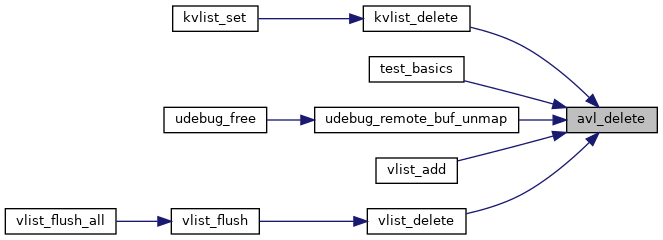
◆ avl_find()
Finds a node in an avl-tree with a certain key
- Parameters
-
tree pointer to avl-tree key pointer to key
- Returns
- pointer to avl-node with key, NULL if no node with this key exists.
Definition at line 115 of file avl.c.


◆ avl_find_greaterequal()
Finds the first node in an avl-tree with a key greater or equal than the specified key
- Parameters
-
tree pointer to avl-tree key pointer to specified key
- Returns
- pointer to avl-node, NULL if no node with key greater or equal specified key exists.
Definition at line 179 of file avl.c.
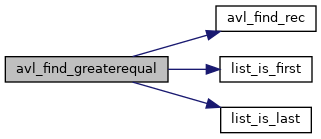
◆ avl_find_lessequal()
Finds the last node in an avl-tree with a key less or equal than the specified key
- Parameters
-
tree pointer to avl-tree key pointer to specified key
- Returns
- pointer to avl-node, NULL if no node with key less or equal specified key exists.
Definition at line 137 of file avl.c.
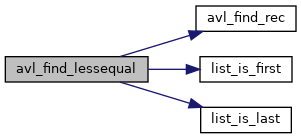
◆ avl_init()
| void avl_init | ( | struct avl_tree * | tree, |
| avl_tree_comp | comp, | ||
| bool | allow_dups, | ||
| void * | ptr | ||
| ) |
Initialize a new avl_tree struct
- Parameters
-
tree pointer to avl-tree comp pointer to comparator for the tree allow_dups true if the tree allows multiple elements with the same ptr custom parameter for comparator
Definition at line 92 of file avl.c.

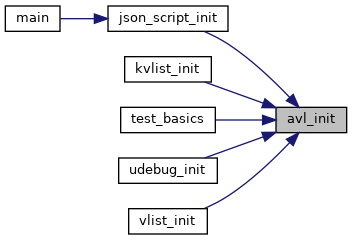
◆ avl_insert()
Inserts an avl_node into a tree
- Parameters
-
tree pointer to tree new pointer to node
- Returns
- 0 if node was inserted successfully, -1 if it was not inserted because of a key collision
Definition at line 220 of file avl.c.
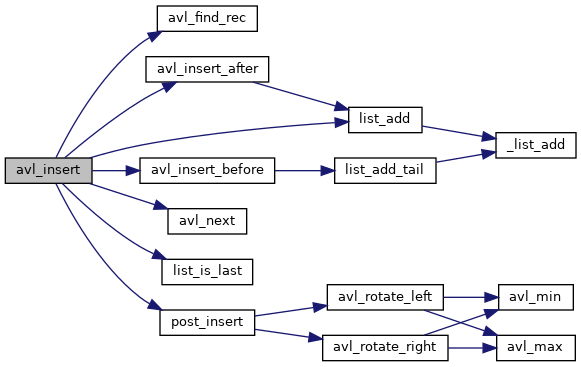
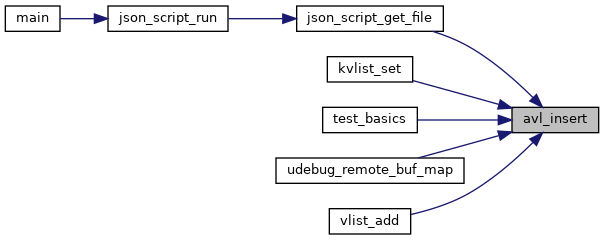
◆ avl_is_empty()
|
inlinestatic |